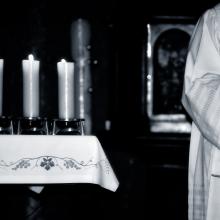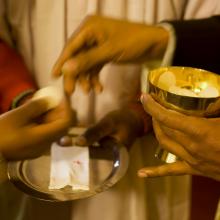closed communion
I attended a funeral last week and was struck by something that happened at communion.
The church was packed for a loving man who had touched many lives with his kindness. People from varied backgrounds and faiths came to celebrate his life and support his family. The eulogy noted that he never turned anyone away.
At communion time, several young adults from a different denomination got in line. When the first young man got to the priest, he received a question instead of a communion wafer. The priest said something to him. The young man looked surprised and shook his head. The priest traced a cross on his forehead and sent him away breadless.
On a day of shared grief, the young man had given the wrong answer to the age-old question: Are you one of us?
When it comes to sharing the Eucharist among faithful but separated Christ followers, I wonder if Jesus is waiting for the churches simply to be the Church?
For the sake of this uncommon meal and the One who gives himself to us in it we can partake together, not on the shaky foundation of our present tragic divisions but on the firm ground of our promised unity by joining now in the Great Feast we will celebrate with him forever in eternity.
It is, after all, his table. It is a table set not only in the presence of our enemies in this world but set also in the unseen realm of Christ’s anticipated future rule that in a mystery comes to each of our houses of worship simultaneously as we gather in hope to encounter his resurrected person, week in and week out.
In this scenario, we remain mindful and respectful of our present divisions yet act on the coming unity we know is ours now by promise because no prayer of Jesus, certainly not his prayer that we be "one," can ever fail (John 17).
As an ecumenist I listened to (and largely bought) the notion that taking Communion with other Christians in the absence of institutional unity was tantamount to premarital sex, to an intimacy that should not be attempted because we were not — as disagreeing Christians — properly wed to each other yet.
But the more time I spend as a day-to-day trenches brand of pastor living out the faith in the real world, I find this argument holds less and less water.
A reality I have come to grips with after decades of personal ecumenical involvement is the same reality that leaders at the highest levels of churches have been wrestling with for centuries: The age-old pursuit of doctrinal unity under an authoritative “true church” will likely never occur before the Second Coming.
Another reality — a more personal one — has hit me with full force. This division at our Eucharists inflicts pain upon those of tender conscience and deep love for Christ and his bride. They are broken upon the rocks of our divisions and it is a scandal.
A Catholic priest who allegedly denied Communion to a lesbian at her mother's funeral has been put on leave pending an investigation of unrelated "intimidating behavior toward parish staff and others," the Archdiocese of Washington said.
The Rev. Marcel Guarnizo, a priest from Moscow who has been serving in the archdiocese since last March, lost his assignment at St. John Neumann Catholic Church in Gaithersburg, Md., on Friday (March 9).
Guarnizo made headlines when Barbara Johnson, a lesbian attending her mother's funeral at the church, said he denied her Communion. At the time, the archdiocese said "issues regarding the suitability of an individual to receive Communion should be addressed by the priest with that person in a private, pastoral setting."
Guarnizo's removal is related to other issues and not the Communion incident, a diocesan spokeswoman said. The archdiocese said an official had received "credible allegations" of Guarnizo's behavior that were considered "incompatible with proper priestly ministry."



